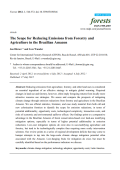
Reducing emissions from agriculture, forestry, and other land uses is considered an essential ingredient of an effective strategy to mitigate global warming. Required changes in land use and forestry, however, often imply foregoing returns from locally more attractive resource use strategies. In this paper, the authors assess and compare the prospects of mitigating climate change through emission reductions from forestry and agriculture in the Brazilian Amazon. They use official statistics, literature, and case study material from both old and new colonization frontiers to identify the scope for emission reductions, in terms of potential additionality, opportunity costs, technological complexity, transaction costs, and risks of economic and environmental spillover effects. Their findings point to a comparative advantage in the Brazilian Amazon of forest conservation-based over land-use modifying mitigation options, especially in terms of higher potential additionality in emission reductions. Low-cost mitigation options do exist also in use-modifying agriculture and forestry, but tend to be technologically complex thus requiring more costly interventionschemes.
This book describes comprehensively potential, co-benefits and drawbacks of carbon (C) sequestration for ecosystem services. Soil generates numerous ecosystem services for human wellbeing and ecological functions. The services discussed include provisional (feed, food, timber, biofuel), regulating (carbon sequestration, pests, diseases), cultural, and supporting (soil formation, nutrient cycling) services. Recarbonization of the biosphere is a potential strategy to redistribute C among global pools, and to enhance ocean but most importantly land-based C sinks with possible feedback on soil-based ecosystem services. Land use and soil management can degrade soil quality, and either reduce quantity and quality of ecosystem services or lead to disservices and create large ecological footprint. Thus, trade-offs between carbon sequestration and ecosystem services must be considered when incentivizing land managers through payments for ecosystem services. Together with sustainable management of land-based C sinks for climate change adaptation and mitigation this will minimize the risks of recarbonization of the biosphere for ecological functions and human wellbeing.
Climate change could potentially interrupt progress toward a world without hunger. A robust and coherent global pattern is discernible of the impacts of climate change on crop productivity that could have consequences for food availability. The stability of whole food systems may be at risk under climate change because of short-term variability in supply. However, the potential impact is less clear at regional scales, but it is likely that climate variability and change will exacerbate food insecurity in areas currently vulnerable to hunger and undernutrition. Likewise, it can be anticipated that food access and utilization will be affected indirectly via collateral effects on household and individual incomes, and food utilization could be impaired by loss of access to drinking water and damage to health. The evidence supports the need for considerable investment in adaptation and mitigation actions toward a “climate-smart food system” that is more resilient to climate change influences on food security.
The marginality concept calls for the integration of poverty concepts with those of social exclusion, geography, and ecology. The difficulties in reaching people at the margins of systems are explained by a set of distances, (i.e., physical distances such as being located in remote or harsh environments), social distances (being excluded, discriminated against, or not having rights or access to services or opportunities), but may also be related to technological and institutional infrastructure deficiencies. A review of policies intended to reduce marginality suggests that none of the marginality determinants need to be accepted as long term. Coherent policies and actions, however, need to match the systemic causality of marginality in order to be effective.
